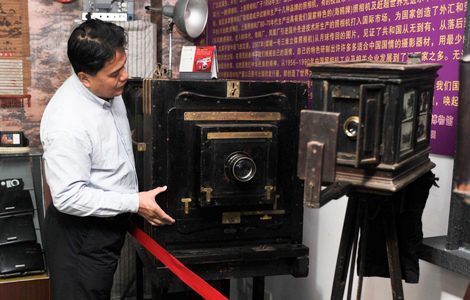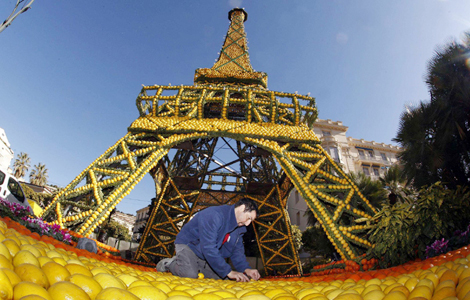Defense for bear bile gathering provokes uproar
Updated: 2012-02-17 17:18
(Xinhua)
|
|||||||||
BEIJING - Claws remain out over the cruelty of bear bile farming, despite a bid by an industry association connected with the practice to quell recent debate.
The China Association of Traditional Chinese Medicine (TCM) convened a press conference on Thursday afternoon to defend Chinese bear farms that breed the animals to extract their bile, a substance commonly used in TCM.
Fang Shuting, head of the association, triggered an uproar on the Internet and escalated the previous controversy over the bile bear farming industry after he compared bile extraction operations to "turning on a tap" at the conference.
"The process of extracting bear bile was as easy, natural and painless as turning on a tap. After the operation was done, bears went out to play happily. I think there was nothing unusual, and (they were) even quite comfortable," Fang recalled his experience in witnessing the operations.
Many users of Weibo, the Twitter-like microblogging site, raised the question "You're not a bear, how do you know how they felt?"
"I shuddered (upon his words)! With a hole in your body, how 'happy' and 'comfortable' it can be?" said a Weibo user with the ID of "st Chen Guizhou."
"To chase profits, a practice that might be fatal can be described as easy as turning on a tap! That's a sheer disrespect to lives," said Hans Zhang, a marketing director who works in a large e-commerce company based in Guangzhou, capital city of southern province of Guangdong.
Lin Jiajia, a media worker in Beijing, told Xinhua that she objected to bile extraction in any form. "I made the conclusion after putting myself in the position of the bears and being exposed to so many sad pictures," she said.
Strong opposition to bear bile extraction shows that the inhumane act has hurt the public's feeling, said Mang Ping, a professor researching relations between humans and animals in Beijjing's Central Socialist Academy.
The press conference came after animal welfare groups and members of the public protested against an initial public offering (IPO) proposed by Guizhentang Pharmaceutical Co Ltd., a company that manufacturers medicine using bile extracted from live bears, that would allow it to expand operations.
Bear bile is believed to cure liver and eye ailments, remove toxins and eliminate fevers.
Fang claimed that techniques have greatly improved. The current method in bear farms has abandoned the use of pipes inserted permanently in the animals' gall bladders and the extraction process is painless.
In the early stages of the industry's development, bile bears were bred in cramped cages, and metal siphons were inserted into their abdomens day and night. The pipes often left the animals with permanent wounds and put them at high risk of lethal infections.
However, Fang said that he had visited a number of bear farms and felt content about their new technology and environment. "Now, after a tube is put into a certain position, the bile will spontaneously spring out, and the tube is taken away when the operation is done," he said.
However, his accounts contradicted previous investigations carried out by animal welfare advocates.
The "painless" method, which builds a channel connecting bears' abdominal walls and gall bladders through surgery, can also leave bears with non-healing wounds, said Zhang Xiaohai, external affairs director of the Animals Asia Foundation.
The Hong Kong-based group works to rescue bile bears and calls for eliminating the industry in China.
"Now we learn the opinion of the medicine association, but our stance on the issue is consistent," Zhang told Xinhua after the conference.
In response to the public's doubts, Fang said a farm would be opened to reporters. He did not clarify when the farm would open to the media, nor did he specify which farm would be involved.
China has 68 legal bear farms with more than 10,000 bears, 6,000 to 8,000 of which, aged above three and with a weight of over 100 kg, are allowed to undergo bile extraction operations, according to Fang.
He said bear farms were closed to the public, unlike circuses and zoos, due to health concerns.
Founded in 2000 and based in eastern Fujian province, Guizhentang is among the country's largest makers of bear bile, according to its website.
Boasting the largest bear breeding base in the southern parts of China, the company has more than 400 bears on its farm and over 100 cubs are born each year. The funds raised through an IPO would help increase the company's breeding capacity to 1,200 bears, producing 4,000 kg of bear bile.
The company first attempted to go public in February last year, but failed amid a fierce public outcry.
Fang denied that his association has a "direct connection" to the IPO plan, adding that Guizhentang is not a member of the China Association of Traditional Chinese Medicine.
Nevertheless, Fang said he had visited Guizhentang's farm. "The living conditions of black bears there are pretty good," he said.
The use of natural bear bile in TCM can not be totally replaced by other ingredients, but many herbs have been proven to have similar medical values, said Zhao Xiaogang, an expert with Beijing Tongrentang Group, a prestigious retailer of traditional Chinese medicine.
Hot Topics
Wu Ying, iPad, Jeremy Lin, Valentine's Day, Real Name, Whitney Houston, Syria,Iranian issue, Sanyan tourism, Giving birth in Hong Kong, Cadmium spill, housing policy
Editor's Picks

|

|

|

|

|

|






